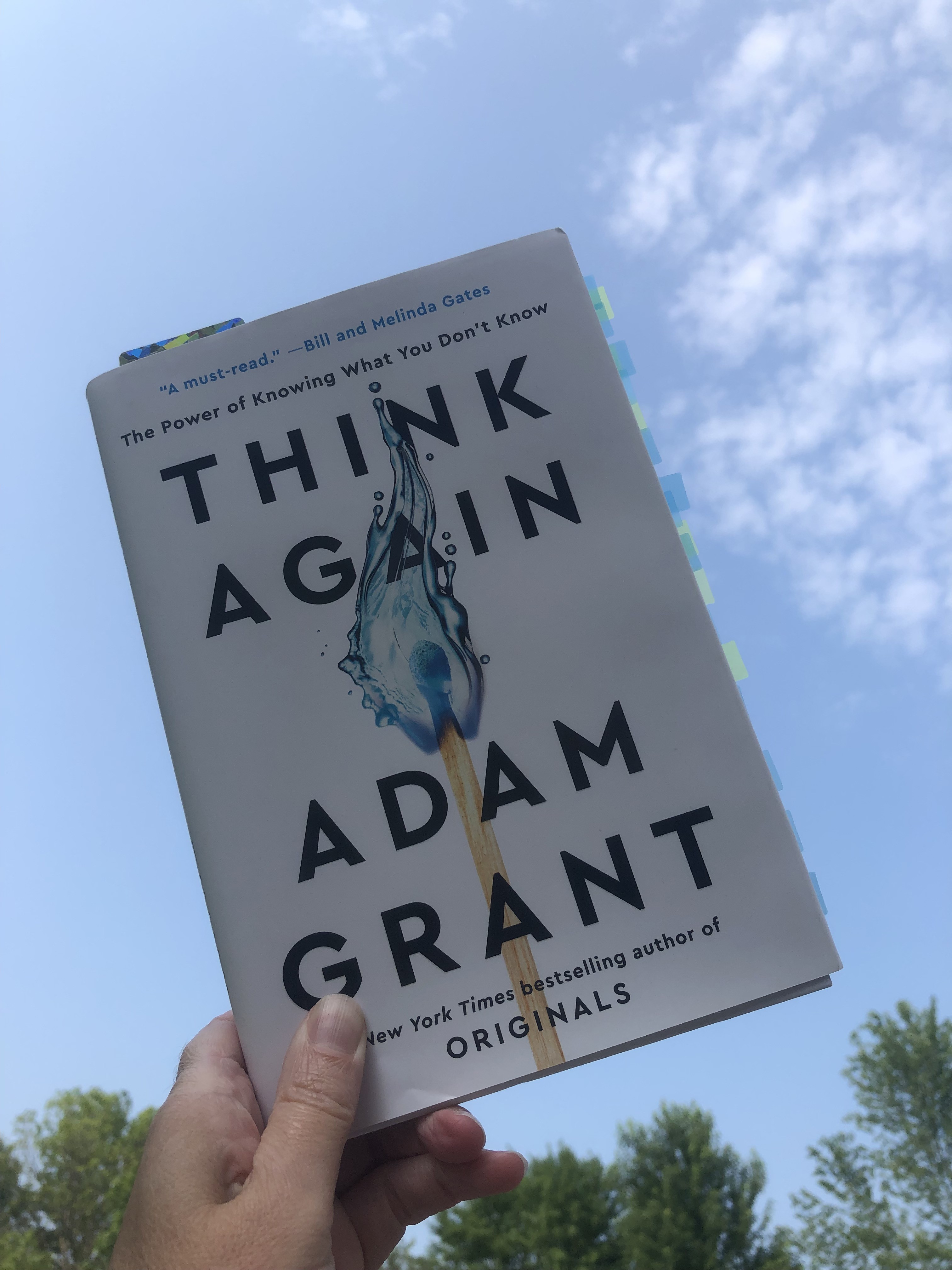
This blog has taken me ages to write – not because I don’t know what to say, but because I basically want to share every word from Think Again with you! I mean, I actually ran out of page flags while reading and annotating:

I’ve enjoyed Grant’s earlier work, but I am blown away by how much value I have gained from Think Again. I am applying its lessons everywhere and continuing to delve deeper into the topics he presents. This book will definitely stick with me long-term!
Overview
Essentially, Think Again encourages us to practice the skill of unlearning, rethinking, and challenging ourselves to not believe every thought we have. Grant states:
Every time we encounter new information, we have a choice. We can attach our opinions to our identities and stand our ground in the stubbornness of preaching and prosecuting. Or we can operate more like scientists, defining ourselves as people committed to the pursuit of truth – even if it means proving our own view wrong. (p76)
Grant’s writing is engaging, thought-provoking, and filled with both quantitative and anecdotal evidence to support his arguments. He shares examples from sports, healthcare, academia, social justice efforts, and more; I have looked up further details on many of the individuals he highlights as they remind us how one person has the power to make a HUGE impact!
Think Again truly feels like a book with something for everyone.
Top Takeaways
As I mentioned, narrowing down my top lessons has proven challenging – I feel like I’ve highlighted about every other sentence! But to get us started, a few standout themes:
1. Detachment requires conscious effort. (And it’s worth it.)
Detachment – what I would summarize as the art of letting go – does not necessarily come easily or naturally to us. We confuse our thoughts with absolute fact, we connect our identity to our opinions, we worry about what others will think if we change our stance or go against the grain.
And we definitely don’t want to feel – or appear – that we’ve been wrong about something our entire lives.
Being able to open ourselves to new thoughts, however, can actually help us become mentally healthier. We can detach our present self from our past self, viewing it as growth instead of placing judgment on how foolish we once were. “It’s a sign of wisdom to avoid believing every thought that enters your mind,” Grant offers. “It’s a mark of emotional intelligence to avoid internalizing every feeling that enters your heart.”
Changing your beliefs over time doesn’t always mean you were wrong or that you’re wishy-washy. It simply means you’ve gained more information, experience, or insight – and have evolved your thinking as a result.
2. We can’t necessarily change other people – but we may be able to help them open their minds.
Grant talks about common tendencies when it comes to our beliefs: We may focus our energy on preaching about all the reasons we’re right, for example, and/or expend our effort telling others all the ways they are wrong.
These strategies, however, can have the opposite effect than we hope: “When we’re trying to persuade people,” writes Grant, “we frequently take an adversarial approach. Instead of opening their minds, we effectively shut them down or rile them up.”
A more effective approach involves enlisting the qualities that scientists tend to adopt: curiosity, humility, collaboration, listening, a willingness to be proven wrong. The examples he offers in Think Again, such as a Black musician who has used the art of conversation to help white supremacists let go of their hatred, are utterly profound.
3. ‘Confident humility’ allows us to honor how far we’ve come while acknowledging how much we’ve yet to learn.
The phrase ‘confident humility’ essentially means believing in yourself while also recognizing you still have more to learn. This blend of security plus room for growth allows us to develop as stronger leaders, achievers, and true difference-makers.
Grant frames this concept using examples of the armchair quarterback and the impostor: When we think we already know everything, as in the case of the armchair quarterback, we leave no room for new ideas or information. Yet when we don’t give ourselves credit for what we do know, like the impostor, we undervalue our worth and hold ourselves back from our full potential. (An interesting side note: Grant points out that what we commonly refer to as impostor syndrome “seems to be particularly pronounced among high achievers.”)
Confident humility, as both a phrase and a concept, has resonated deeply with me and with many of my coaching clients as well. We can believe in ourselves while acknowledging we still have more to learn; we can honor our strengths while still recognizing – but not being taken down by – the fact that we also have weaknesses.
I wrote a few more thoughts about confident humility here.
I’ve written other takeaways here – oh, and here, too. (I’m telling you, I can’t get enough!)
Closing Thoughts
It’s rare to come across a book I feel is applicable to just about anyone, but Think Again is such a book. I’d especially recommend it to leaders, educators, and those who often find themselves in negotiation conversations (ie, sales professionals, mediators, change-makers). In addition, this would be a valuable resource for anyone in the business of helping others improve their quality of life – physicians, counselors, healers, and the like – particularly the sections on motivational interviewing.
But in all honesty, Think Again could improve conversations in nearly any household or relationship, as well as in the overall realm of personal growth. His points around meaning, psychological safety, arguing effectively … I could go on and on.
I’ve read over 60 books so far this year, and Think Again is an absolute standout among them. Pick it up, devour its wisdom, and let me know your takeaways!
Christi Hegstad, PhD, PCC, is the Practical + Purposeful Coach for Achievers! Join our email community for weekly coaching tips, free resources, book recommendations, and more!
* Think Again was written by Adam Grant and published by Viking, an imprint of Penguin Random House LLC. Copyright © 2021.





